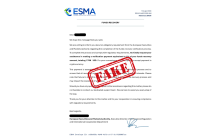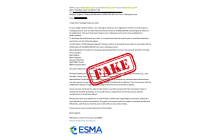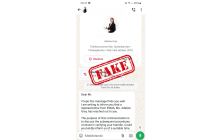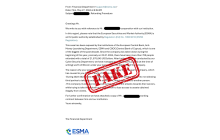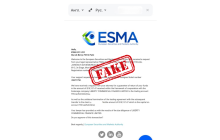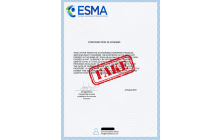Frauds and Scams related to ESMA Logo and ID
Fraudsters often use ESMA’s name and logo to promote scams. Find out what frauds and scams can look like, how you can protect yourself and what you should do if you have become a victim of investment fraud.
Frauds and scams can be addressed to you in many different ways. The information on this webpage does not cover all practices of ESMA Logo and ID frauds and scams.
main_blue_background
How can I recognise a scam?
- A scammer’s or fraudster’s aim is to mislead you and obtain your money. In order to achieve their goal, they might try to contact you by using multiple communication channels, such as email, phone calls, SMS, social media platforms. At first, these emails can seem too good to be true or are just unexpected.
- You might be asked to provide personal information to allow money transfers and international payments. In other cases, you would be invited to transfer money from your own bank account; for example, to pay a so-called administrative fee. The fraudsters often present themselves as ESMA officials and approach their victims on the pretext of helping them recover their funds. Others claim to work for ESMA and to be investigating an investment firm.
- Fraudsters often use ESMA’s name and logo to promote scams. They might present themselves as ESMA employees, provide documents and certificates which are counterfeits or attempt to copy ESMA’s website.
primary_grey_background
ESMA will never approach you and ask for your personal details under the pretext of helping you to recover funds that you lost or asking you to pay an administrative fee.
violet_background
How can I protect myself from being scammed?
- Never reveal personal or financial data including usernames, passwords, bank details, addresses, or existing insurance/pensions/investment details.
- Do not click on links or open emails from senders you do not already know.
- Check ESMA’s official website: www.esma.europa.eu. Any other websites using ESMA’s logo, name or its interface are fake and used for fraudulent purposes.
- Please use these steps to check whether you are really communicating with ESMA:
- Check the e-mail address.
ESMA’s e-mails only end with @esma.europa.eu. Please be aware that in some cases the fraudsters might try to create a fake email address and mimic ESMA’s official one. When in doubt, please contact scamreport@esma.europa.eu directly. - Check the office address (if provided).
ESMA is only based in Paris, France. It has no affiliates or branch offices elsewhere. All other addresses are fake. - Check the phone number (if provided).
ESMA’s telephone numbers only start with +33 for France. All other phone numbers are fake.
primary_grey_background
What can I do as a victim?
- Make sure you are aware of your rights as a victim of a crime by using the European e-Justice Portal.
- If you have already been in contact with the fraudsters, stop all interactions.
As a next step, please consider the following:
- Report your case to local law enforcement authorities, such as the police.
- Inform your National Competent Authority (NCA).
- The IOSCO Investor Alerts Portal can be searched if you are suspecting a scam or other illegal investment activities. Potential investors should however not assume, in the absence of a relevant warning on the IOSCO Investor Alerts Portal, that companies who approach them offering investment services are authorised or legitimate. Rather, you should always check with your domestic regulator whether a company is authorised to provide investment services
- Reach out to your financial services consumer organisations.
- Make sure you are aware of your rights as a victim of a crime by using the European e-Justice Portal.
- Approach a lawyer to consider taking legal action against the firm.
- ESMA is not able to deal with investment fraud cases. Unfortunately, we cannot assist you in your matter.
- However, in case of doubts or suspicions about the authenticity of any correspondence received that claiming to be from or linked to ESMA or its representatives, you can reach us by e-mail: scamreport@esma.europa.eu
primary_grey_background

